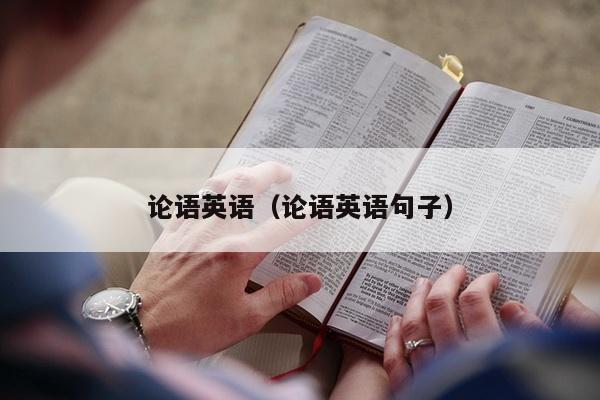论语的英文是什么?
论语的英文是The Analects of Confucius。
重点词汇:Confucius
n. 孔子(中国哲学家,教育家)
短语
Confucius Institute 孔子学院 ; 孔子学堂 ; 孔子 ; 孔子学院孔子课堂孔子学校汉学院孔子学堂中华传统文化
disciples of confucius 孔子弟子列表 ; 孔子弟子
Analects of Confucius 论语
同根词
词根: Confucian
adj.
Confucian 孔子的,儒家的;儒家学说的
n.
Confucianism 孔子学说;儒家思想
Confucian 儒家,儒家学者;孔子的门徒

《论语》这本书的名字英语怎么翻译?
《论语》 [1]英文:The Analects of Confucius
“论语”在汉英词典中的解释(来源:百度词典):
1.The Analects of Confucius, one of the Four Books
论语十则英语翻译
子曰:「学而时习之, 不亦说乎。 有朋自远方来, 不亦乐乎。人不知而不愠, 不亦君子乎 」
Confucius said: "Isn’t it a pleasure to study and practice what you have learned? Isn’t it also great when friends visit from distant places? If people do not recognize me and it doesn’t bother me, am I not a Superior Man?"
子曰:「不患人之不己知, 患不知人也。」
Confucius said: "I am not bothered by the fact that I am unknown. I am bothered when I do not know others."
子曰:「道之以政, 齐之以刑, 民免而无耻; 道之以德, 齐之以礼, 有耻且格。」
Confucius said: "If you govern the people legalistically and control them by punishment, they will avoid crime, but have no personal sense of shame. If you govern them by means of virtue and control them with propriety, they will gain their own sense of shame, and thus correct themselves."
子曰:「吾十有五而志于学, 三十而立, 四十而不惑, 五十而知天命, 六十而耳顺, 七十而从心所欲, 不逾矩。」
Confucius said: "At fifteen my heart was set on learning; at thirty I stood firm; at forty I had no more doubts; at fifty I knew the mandate of heaven; at sixty my ear was obedient; at seventy I could follow my heart’s desire without transgressing the norm."
子曰:「温故而知新, 可以为师矣。」
Confucius said: "Reviewing what you have learned and learning anew, you are fit to be a teacher."
子曰:「君子不器。」
Confucius said: "The Superior Man is not a utensil."
子贡问君子。子曰:「先行其言, 而后从之。」
Tzu Kung asked about the character of the Superior Man. Confucius said, "First he practices what he preaches and then he follows it."
子曰:「学而不思则罔, 思而不学则殆。」
Confucius said: "To study and not think is a waste. To think and not study is dangerous."
子曰:「由、诲女知之乎。 知之为知之, 不知为不知, 是知也。」
Confucius said: "Yu, shall I teach you about knowledge? What you know, you know, what you don’t know, you don’t know. This is knowledge."
子曰:「人而不仁, 如礼何。人而不仁, 如乐何 」
Confucius said: "If a man has no humaneness what can his propriety be like? If a man has no humaneness what can his music be like?"
希望对你有帮助!
“论语是中国古代文化的经典著作”用英语怎么翻译?
“论语是中国古代文化的经典著作”翻译:The Analects are the classic works of ancient Chinese culture.
《论语》由孔子弟子及再传弟子编写而成,至汉代成书。主要记录孔子及其弟子的言行,较为集中地反映了孔子的思想,是儒家学派的经典著作之一。以语录体为主,叙事体为辅,集中体现了孔子的政治主张、伦理思想、道德观念及教育原则等。与《大学》《中庸》《孟子》并称“四书”,与《诗经》《尚书》《礼记》《周易》《春秋》等“五经”,总称“四书五经”。全书共20篇、492章,首创 “语录体” 。是中国现传扬并学习的古代著作之一。
求 孔子论语 英语版
上面网站不错,比较多
这个也可以去看看
下面的是一些摘录,来自网上资源
一)子曰:”学而时习之,不亦悦乎?有朋自远方来,不亦乐乎?人不知而不愠,不亦君子乎?”
The Master said,To learn and at due times to repeat what one has learnt, is that not after all a pleasure? That friends should come to one from afar, is this not after all delightful?To remain unsoured even though one's merits are unrecognized by other, is that not after all what is expected of a gentleman?
(二)子曰:”吾十有五而志乎学,三十而立,四十而不惑,五十而知天命,六十耳顺,七十而从心所欲不逾矩.”
The master ssaid, At fifteen I set my heart upon learning. At thirty, I planted my feet firm upon the ground. At forty, I no longer suffered fromperplexities. At fifty, I knew what were the biddings of heaven. At sixty, I heard them with docile ear. At seventy, I could follow the dictates of my own heart; for what I destred no longer overstepped the boundaries of right.
(三)子曰:”贤哉回也!一箪食,一瓢饮,在了;陋巷,人不堪其忧,回也不改其乐.贤哉回也!”
The master said,Incomparable indeed was hui!A hardful of rice to eat,a gourdful of water to drink,living in a mean steer-others would have found it unendurably depressing.but to Hui's cheerfulness it made no difference at all. Incomparable indeed was Hui!
论语英文版CONFUCIAN ANALECTS
P1
The Master "Is it not pleasant to learn with a constant perseverance and
application?
"Is it not delightful to have friends coming from distant quarters?
"Is he not a man of complete virtue, who feels no discomposure though men
may take no note of him?"
The philosopher Yu said, "They are few who, being filial and fraternal, are
fond of offending against their superiors. There have been none, who, not liking
to offend against their superiors, have been fond of stirring up confusion.
"The superior man bends his attention to what is radical. That being
established, all practical courses naturally grow up. Filial piety and fraternal
submission,-are they not the root of all benevolent actions?"
The Master said, "Fine words and an insinuating appearance are seldom
associated with true virtue."
The philosopher Tsang said, "I daily examine myself on three points:-whether,
in transacting business for others, I may have been not faithful;-whether, in
intercourse with friends, I may have been not sincere;-whether I may have not
mastered and practiced the instructions of my teacher."
The Master said, "To rule a country of a thousand chariots, there must be
reverent attention to business, and sincerity; economy in expenditure, and love
for men; and the employment of the people at the proper seasons."
The Master said, "A youth, when at home, should be filial, and, abroad,
respectful to his elders. He should be earnest and truthful. He should overflow
in love to all, and cultivate the friendship of the good. When he has time and
opportunity, after the performance of these things, he should employ them in
polite studies."
Tsze-hsia said, "If a man withdraws his mind from the love of beauty, and
applies it as sincerely to the love of the virtuous; if, in serving his parents,
he can exert his utmost strength; if, in serving his prince, he can devote his
life; if, in his intercourse with his friends, his words are sincere:-although
men say that he has not learned, I will certainly say that he has.
The Master said, "If the scholar be not grave, he will not call forth any
veneration, and his learning will not be solid.
"Hold faithfulness and sincerity as first principles.
"Have no friends not equal to yourself.
"When you have faults, do not fear to abandon them."
The philosopher Tsang said, "Let there be a careful attention to perform the
funeral rites to parents, and let them be followed when long gone with the
ceremonies of sacrifice;-then the virtue of the people will resume its proper
excellence."
Tsze-ch'in asked Tsze-kung saying, "When our master comes to any country, he
does not fail to learn all about its government. Does he ask his information? or
is it given to him?"
Tsze-kung said, "Our master is benign, upright, courteous, temperate, and
complaisant and thus he gets his information. The master's mode of asking
information,-is it not different from that of other men?"
The Master said, "While a man's father is alive, look at the bent of his
will; when his father is dead, look at his conduct. If for three years he does
not alter from the way of his father, he may be called filial."
The philosopher Yu said, "In practicing the rules of propriety, a natural
ease is to be prized. In the ways prescribed by the ancient kings, this is the
excellent quality, and in things small and great we follow them.
"Yet it is not to be observed in all cases. If one, knowing how such ease
should be prized, manifests it, without regulating it by the rules of propriety,
this likewise is not to be done."
The philosopher Yu said, "When agreements are made according to what is
right, what is spoken can be made good. When respect is shown according to what
is proper, one keeps far from shame and disgrace. When the parties upon whom a
man leans are proper persons to be intimate with, he can make them his guides
and masters."
The Master said, "He who aims to be a man of complete virtue in his food
does not seek to gratify his appetite, nor in his dwelling place does he seek
the appliances of ease; he is earnest in what he is doing, and careful in his
speech; he frequents the company of men of principle that he may be rectified:-
such a person may be said indeed to love to learn."
Tsze-kung said, "What do you pronounce concerning the poor man who yet does
not flatter, and the rich man who is not proud?" The Master replied, "They will
do; but they are not equal to him, who, though poor, is yet cheerful, and to him,
who, though rich, loves the rules of propriety."
Tsze-kung replied, "It is said in the Book of Poetry, 'As you cut and then
file, as you carve and then polish.'-The meaning is the same, I apprehend, as
that which you have just expressed."
The Master said, "With one like Ts'ze, I can begin to talk about the odes. I
told him one point, and he knew its proper sequence."
The Master said, "I will not be afflicted at men's not knowing me; I will be
afflicted that I do not know men."/P
『⒈1』子曰:“学而时习之,不亦说乎?有朋自远方来,不亦乐乎?人不知而不/P
愠,不亦君子乎?”/P
『⒈2』有子曰:“其为人也孝弟,而好犯上者,鲜矣;不好犯上,而好作乱者,/P
未之有也。君子务本,本立而道生。孝弟也者,其为仁之本与!”/P
『⒈3』子曰:“巧言令色,鲜矣仁!”/P
『⒈4』曾子曰:“吾日三省吾身——为人谋而不忠乎?于朋友交而不信乎?传不/P
习乎?”/P
『⒈5』子曰:“道千乘之国,敬事而信,节用而爱人,使民以时。”/P
『⒈6』子曰:“弟子,入则孝,出则弟,谨而信,凡爱众,而亲仁。行有余力,/P
则以学文。”/P
『⒈7』子夏曰:“贤贤易色;事父母,能竭其力;事君,能致其身;于朋友交,/P
言而有信。虽曰未学,吾必谓之学矣。”/P
『⒈8』子曰:“君子不重,则不威;学则不固。主忠信。无友不如己者。过,则/P
勿惮改。”/P
『⒈9』曾子曰:“慎终,追远,民德归厚矣。”/P
『⒈10』子禽问於子贡曰:“夫子至於是邦也,必闻其政,求之与?抑与之与?/P
子贡曰:“夫子温、良、恭、俭、让以得之。夫子之求之也,其诸异乎人之求之与/P
?”/P
『⒈11』子曰:“父在,观其志;父没,观其行;三年无改於父之道,可谓孝矣/P
。”/P
『⒈12』有子曰:“礼之用,和为贵。先王之道,斯为美;小大由之。有所不行/P
,知和而和,不以礼节之,亦不可行也。”/P
『⒈13』有子曰:“信近於义,言可复也。恭近於礼,远耻辱也。因不失其亲,/P
亦可宗也。”/P
『⒈14』子曰:“君子食无求饱,居无求安,敏於事而慎於言,就有道而正焉,/P
可谓好学也已。”/P
『⒈15』子贡曰:“贫而无谄,富而无骄,何如?”子曰:“可也;未若贫而乐/P
,富而好礼者也。”/P
子贡曰:“诗云:‘如切如磋,如琢如磨’,其斯之谓与?”子曰:“赐也,/P
始可与言诗已矣,告诸往而知来者。”/P
『⒈16』子曰:“不患人之不己之,患不知人也。”/P
其实网上关于这方面还是挺多的,这也只是一部分,如不能满足,可继续搜索
或者买一本外研社出版的论语英文版,也不贵,好像才10左右
good luck
用英语怎么说?谢谢
Analects of Confucius
《论语》,是孔子弟子及再传弟子记录孔子及其弟子言行而编成的语录文集,成书于战国前期。全书共20篇492章,以语录体为主,叙事体为辅,较为集中地体现了孔子及儒家学派的政治主张、伦理思想、道德观念及教育原则等。
作品多为语录,但辞约义富,有些语句、篇章形象生动,其主要特点是语言简练,浅近易懂,而用意深远,有一种雍容和顺、纡徐含蓄的风格,能在简单的对话和行动中展示人物形象。
作品鉴赏
《论语》多为语录,但都辞约义富,有些语句、篇章形象生动。如《子路曾皙冉有公西华侍坐》不仅篇幅较长,而且注重记述,算得上一篇结构完整的记叙文,人物形象鲜明,思想倾向通过人物表情、动作、对话自然地显露出来,具有较强的艺术性。
孔子是《论语》描述的中心,“夫子风采,溢于格言”(《文心雕龙·征圣》);书中不仅有关于他的仪态举止的静态描写,而且有关于他的个性气质的传神刻画。此外,围绕孔子这一中心,《论语》还成功地刻画了一些孔门弟子的形象。如子路的率直鲁莽,颜回的温雅贤良,子贡的聪颖善辩,曾皙的潇洒脱俗等等,都称得上个性鲜明,能给人留下深刻印象。













